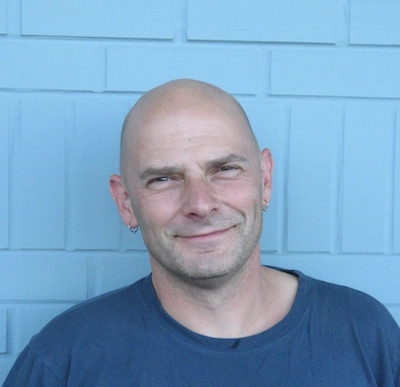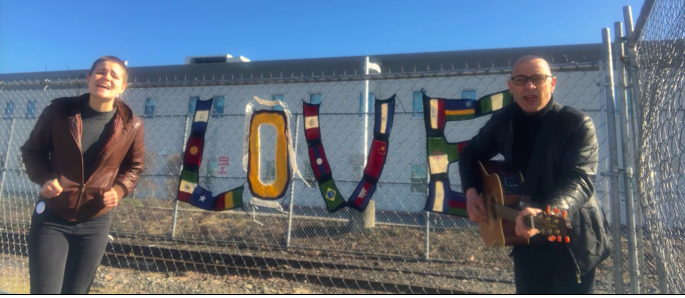Earth Week: Special Edition of Good Climate News this Week!
Apr 26, 2024
 I’m probably not what you’d expect an environmental advocate to be like. For 22 years, I toured around Europe and the U.S. in a punk rock band called Chumbawamba — you may know us from our hit song “Tubthumping.” My music career began when I was 18, and even as a young musician it was very apparent to me that our planet was rapidly changing. While we were touring throughout the 90s, I kept reading and hearing about the phenomenon of “global warming,” and it started to feel real to me as the summer temperatures in England — my home at the time — kept getting hotter, with new high temperature records being set. Then, we played a show in Prague in 2002, just a week after the city experienced historic flooding on the Danube River. I had been to Prague before and seeing the devastation of the flood struck me at my core. There were tree trunks stuck in basement windows, and the waterline extended well above street level. We heard all around that this wasn’t normal — that it was caused by climate change. That’s when the depth of the crisis really started to hit me.
I’m probably not what you’d expect an environmental advocate to be like. For 22 years, I toured around Europe and the U.S. in a punk rock band called Chumbawamba — you may know us from our hit song “Tubthumping.” My music career began when I was 18, and even as a young musician it was very apparent to me that our planet was rapidly changing. While we were touring throughout the 90s, I kept reading and hearing about the phenomenon of “global warming,” and it started to feel real to me as the summer temperatures in England — my home at the time — kept getting hotter, with new high temperature records being set. Then, we played a show in Prague in 2002, just a week after the city experienced historic flooding on the Danube River. I had been to Prague before and seeing the devastation of the flood struck me at my core. There were tree trunks stuck in basement windows, and the waterline extended well above street level. We heard all around that this wasn’t normal — that it was caused by climate change. That’s when the depth of the crisis really started to hit me.
When my time with the Chumbawambas was done, I moved with my family to Washington state in 2007, which is a completely different environment from where I grew up. I have lived here for 12 years with the beautiful wilderness of the Cascade Mountains right on my back doorstep. And over the last five or six years, I’ve experienced the impacts of climate change first hand: my community was impacted by super intense wildfires. Some of my neighbors grew up with wildfires, but now — due to climate change — the wildfire season is two months longer than it used to be, and it’s drier than it used to be. And we’re not alone, these climate-exacerbated wildfires are more intense across the West Coast, and climate-exacerbated disasters of all kinds are materializing across local climate systems throughout the world.
Having personally experienced the effects of climate change, I am compelled to make art that engages with the environmental crisis we are living in. It’s a natural thing for me to react to what is going on around me and share that through music, film, and theater. Chumbawamba did that throughout our music career, responding to a range of social issues that we felt compelled to write songs about. And now, as a solo artist, I have teamed up with a singing partner, Kira Wood Cramer — we often react to the political attacks on the environment through music.

The election of Donald Trump was probably the worst possible scenario in terms of stalling the necessary, concerted action needed to tackle the climate crisis because, as we have seen, the Trump administration is in absolute denial. I have no other choice but to respond to Trump’s environmental attacks, and it naturally comes out in my songwriting and music videos. One song, called Autonomic Stress, I wrote in response to the 2014 Carlton Complex Fire which, at the time, was the biggest wildfire in Washington state history. During this fire, my family was under threat of evacuation and we had friends who were in the direct line of the fire and some lost their homes. The following year 2015, the Twisp River Fire started a mile from the house where we lived. That time, we were evacuated. The next day, we went back to the property thinking it wasn’t going to be there. Thankfully, our house survived the fire, but others weren’t so lucky. My friends and neighbors homes were destroyed by the wildfire’s catastrophic blaze.
Just in the last five years these major climate-exacerbated wildfires have become our new normal here in north-central Washington. My community is a close community, it’s an artistic community, but our politics encompass the whole spectrum — nevertheless, when these wildfires come, we’re all in this together. Some people may try to cast doubt on the connection between wildfires and climate change, but when you’re experiencing it for yourself there’s really no doubt about it. Strangely, I’m hopeful because these climate disasters can bring people together and provide the foundation for consensus and some real change. Climate change is a terrible thing, and wherever we are on the planet, we are all being confronted with it in different ways.
Now, I am touring around the country to show people that although we are all experiencing the effects of climate change, we are not alone. We actually get to talk to people, and it’s a good way of reinforcing the idea that there is a community of dissent that is not happy with the way that the world is being run. The fossil fuel corporations have had a monopoly on how we power our planet for over 100 years, and they don’t want to give it up — they won’t give it up without a huge struggle. So, with my music, I am trying to be one of many varied and different voices that is putting this existential crisis where it should be: in the mainstream, popular discussion. The longer we procrastinate on solving the climate crisis, the worse it’s going to get for all of us. And together, with LCV supporters across the country, we’re all a part of a huge, grassroots movement that is agitating for meaningful change.